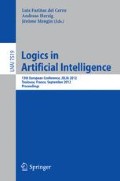Abstract
We introduce the concept of bisimulation between Datalog goals: two Datalog goals are bisimilar with respect to a given Datalog program when their SLD-trees, considered as relational structures, are bisimilar. We address the problem of deciding whether two given goals are bisimilar with respect to given programs. When the given programs are hierarchical or restricted, this problem is decidable in 2EXPTIME.
Access this chapter
Tax calculation will be finalised at checkout
Purchases are for personal use only
Preview
Unable to display preview. Download preview PDF.
References
Bol, R.N.: Loop Checking in Partial Deduction. J. Logic Programming 16, 25–46 (1993)
Bol, R.N., Apt, K.R., Klop, J.W.: An Analysis of Loop Checking Mechanisms for Logic Programs. Theoretical Computer Science 86, 35–79 (1991)
Devienne, P., Lebégue, P., Routier, J.-C.: Halting Problem of One Binary Horn Clause is Undecidable. In: Enjalbert, P., Wagner, K.W., Finkel, A. (eds.) STACS 1993. LNCS, vol. 665, pp. 48–57. Springer, Heidelberg (1993)
Gabbrielli, M., Levi, G., Meo, M.C.: Observable Behaviors and Equivalences of Logic Programs 122, 1–29 (1992)
Harland, J.: On Normal Forms and Equivalence for Logic Programs. In: Proceedings of the Joint International Conference and Symposium on Logic Programming, pp. 146–160 (1992)
Hennessy, M., Milner, R.: On Observing Nondeterminism and Concurrency. In: de Bakker, J.W., van Leeuwen, J. (eds.) ICALP 1980. LNCS, vol. 85, pp. 299–309. Springer, Heidelberg (1980)
Hoare, C.A.R.: Communicating sequential processes. Commun. ACM 21, 666–677 (1978)
Lifschitz, V., Pearce, D., Valverde, A.: Strongly Equivalent Logic Programs. ACM Transactions on Computational Logic (2000)
Lloyd, J.W.: Foundations in Logic Programming. Springer (1984)
Maher, M.: Equivalences of Logic Programs. In: Shapiro, E. (ed.) ICLP 1986. LNCS, vol. 225, pp. 410–424. Springer, Heidelberg (1986)
Milner, R.: Calculi for synchrony and asynchrony. Theoretical Computer Science 25, 267–310 (1983)
Park, D.: Concurrency and Automata on Infinite Sequences. In: Proceedings of the 5th GI-Conference on Theoretical Computer Science, pp. 167–183. Springer, UK (1981)
Sangiorgi, D.: On the origins of bisimulation and coinduction. In: ACM Trans. Program. Lang. Syst., pp. 1–41. ACM, USA (2009)
Author information
Authors and Affiliations
Editor information
Editors and Affiliations
Rights and permissions
Copyright information
© 2012 Springer-Verlag Berlin Heidelberg
About this paper
Cite this paper
Balbiani, P., Yaacoub, A. (2012). Deciding the Bisimilarity Relation between Datalog Goals. In: del Cerro, L.F., Herzig, A., Mengin, J. (eds) Logics in Artificial Intelligence. JELIA 2012. Lecture Notes in Computer Science(), vol 7519. Springer, Berlin, Heidelberg. https://doi.org/10.1007/978-3-642-33353-8_6
Download citation
DOI: https://doi.org/10.1007/978-3-642-33353-8_6
Publisher Name: Springer, Berlin, Heidelberg
Print ISBN: 978-3-642-33352-1
Online ISBN: 978-3-642-33353-8
eBook Packages: Computer ScienceComputer Science (R0)

